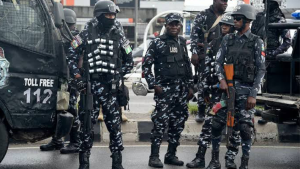
Mother arrested for burning 7 year-old daughter with hot iron over piece of meat
She asked her daughter to serve meat to her younger brother, but when she noticed the girl ate from it, she plugged an electric iron and used it to burn her..."
Read More
Comment
0

Ndume to Tinubu: ‘Be worried If Buhari isn’t on your side
Senator Ali Ndume has asked President Bola Ahmed Tinubu to be worried if ex-President Muhamamdu Buhari is not on his side.
Read More
Comment
0

Magisterial judge sentenced after shooting boyfriend in the head
This wasn’t McKnight’s first shooting — she previously shot her ex-husband in the groin but claimed self-defense.
Read More
Comment
0

Judge allows deportation of Columbia activist Mahmoud Khalil
While a student at Columbia University, Khalil was part of a leadership group protesting the war in Gaza. Khalil took part in negotiations with school administrators demanding the institution cut ties with Israel and divest from Israeli companies.
Read More
Comment
0

Five easier visa destinations for Nigerians
Despite the stringent rules of visa application for Nigerians, there are fewer well-known nations with simpler visa requirements.
Read More
Comment
0

Tree planted by Jackson in honor of late wife taken down at White House
A magnolia tree thought to have been planted on the White House grounds by President Andrew Jackson in honor of his late wife was cut down so it wouldn’t fall on anyone.
Read More
Comment
0

Real ID deadline for air travel set for May 7, says DHS Secretary Noem
Department of Homeland Security Sec. Kristi Noem announced anyone wanting to fly needs a Real ID by May 7th
Read More
Comment
0

Apple ships 600 tons of iPhones in a hurry to ‘beat’ new tariffs
Based on the planes’ capacity and the weight of iPhones plus packaging, the outlet estimates that about 1.5 million devices were shipped out since March, which could help Apple avoid raising prices for a while.
Read More
Comment
0

Atiku confirms coalition talks after visit to Buhari
Former Vice President Atiku Abubakar has confirmed ongoing coalition discussions.
This follows a recent visit to former President Muhammadu Buhari.
Read More
Comment
0

Pres. Tinubu meets US State Department Senior Advisor, Massad Boulos, in Paris.
President Bola Tinubu met with US Deputy Secretary of State Kurt Campbell in Paris to discuss regional security, economic cooperation, and support for democracy in West Africa.
Read More
Comment
0